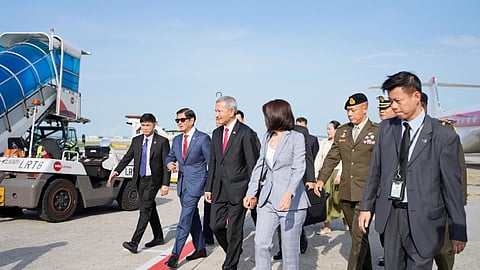
- NEWS
- the EDIT
- COMMENTARY
- BUSINESS
- LIFE
- SHOW
- ACTION
- GLOBAL GOALS
- SNAPS
- DYARYO TIRADA
- MORE

SINGAPORE — President Ferdinand Marcos Jr. said there are ongoing efforts to support overseas Filipino Workers (OFWs) who have been away from the Philippines for extended periods and face limited livelihood options upon their return.
Before departing for Singapore, Marcos acknowledged in Brunei that the need for such programs for OFWs became evident during the pandemic when many were repatriated for health and safety reasons.
“We could not just send them back into there... you’re familiar with the situation that happened. We had to find jobs for the overseas Filipino workers that had come back,” Marcos said.
“So they were initiated like Tulong Panghanapbuhay sa Ating Disadvantaged/Displaced Workers (TUPAD). The TUPAD project is a program specifically for that. It is for workers who have lost their jobs for whatever reason, or would like to transfer,” Marcos said.
Marcos emphasized the importance of retraining, upskilling, and reskilling not only for OFWs but also for the local working population.
Hence, he said, the government has allotted a bigger budget for the Technical Education and Skills Development Authority (TESDA) to absorb retired and displaced OFWs.
The Department of Budget and Management had allocated P15.2 billion for TESDA’s skills development and scholarship programs under the 2024 National Expenditure Program.
Marcos highlighted the collaboration between the government and the private sector to make sure the training programs would lead to employment opportunities.
“For example, there are schools that have been... the maritime sector is one of the best examples. They are working very closely with the industry. Usually, when it comes to technical skills, the training of the person needs to be very specific. The good thing about this is that they have a job immediately because that is what the private corporation is looking for,” Marcos said.
Skilled but jobless
The President stressed the importance of strengthening the employment side of livelihood programs, noting that many initiatives fail when there are no job placements after training.
“So, you know, I’ve also tried very hard to strengthen the side of employment because there are a lot of livelihood programs,” he said. He noted that some of the returning OFWs had learned new skills, but there was still a lack of job opportunities.
“And the point of the exercise is to get employed. So there needs to be placement on the other side, and that’s where the private sector comes in. They will tell you this is what we need,” he said.
As of 2023, there were an estimated 2.33 million registered OFWs, with their annual remittances said to represent nine percent of the Philippines’ gross domestic product.
Meanwhile, the Philippines’ interest in waste-to-energy projects is still at the micro level as the country is transitioning from fossil fuels to renewables, Marcos said on Thursday.
In a meeting with Brunei’s major players in the energy sector, Marcos said legal and regulatory concerns and local government waste scales are hurdles to implementing waste-to-energy projects.
“There’s a great deal of interest in that (waste-to-energy). But right now, it is not at the very macro level. It’s very much at the micro level. Yeah, it’s basically local governments because there is the problem, the attendant problem of what do we do with our waste,” Marcos said.
“The old solution was to ship them somewhere else and pay somebody else to put them in a landfill. Nobody wants it anymore. That’s a problem, especially in the big cities. But then that’s also where that solution could be most viable,” he said.
However, Marcos said the country is still interested in investing in waste-to-energy projects, as well as enhancements on oil and gas collaborations.
“But I think the legislators are coming to the understanding that there actually are viable and clean solutions to the problem of waste disposal. So you take care of two very difficult problems at the same time,” he said.
The President met with the BSP, BLNG, Total Energies in Brunei, Serikandi Oilfield Services, and Adinin Group of Companies.
Brunei is connecting with neighboring nations to explore renewable energy-based connectivity, according to the Presidential Communications Office. The PCO said oil and gas would remain vital to the regional energy balance during the transition.
